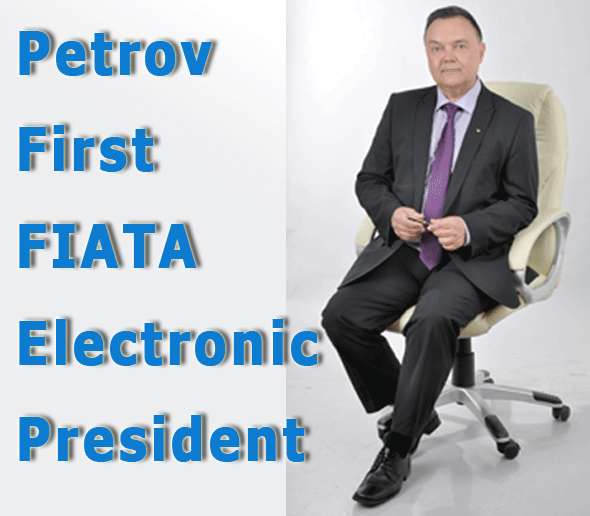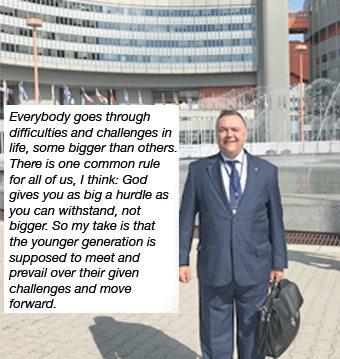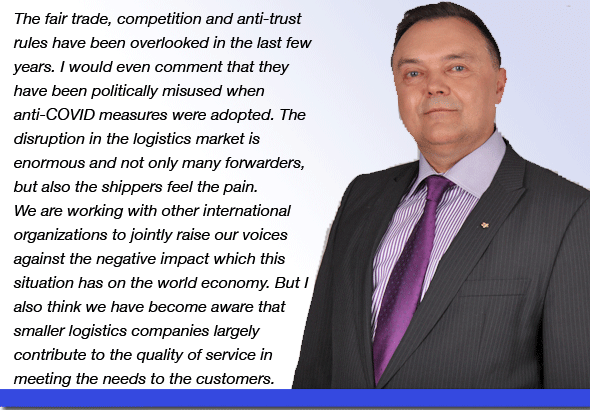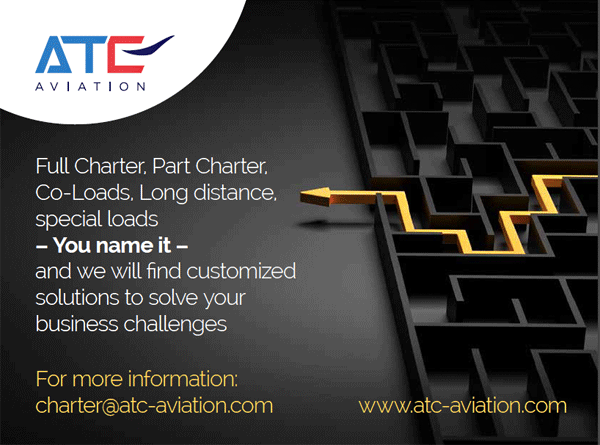| 
|
World Exclusive: Marco Sorgetti in a candid first-person
interview with the President of the largest freight forwarder organization
in the world.
Ivan Petrov has become the 32nd FIATA President
in November 2021 and is the first one to have been elected by electronic
vote. In 2019 FlyingTypers had already published an article about
President Petrov, then Senior Vice President of FIATA. His personality
and career had been amply described in the article and the reader who
wishes to get more information on the steps taken by this successful entrepreneur
is more than welcome to read the article again here.
One of the meanings of the ancient Greek
term “sofia ( )”
is wisdom and it is not by chance that Sofia is the city where Ivan was
born in 1958. In my view this trait most appropriately describes the impression
one gets from Ivan. He surely knows what to do and how to get where he
wants, but he also has remarkable understanding for the others and never
makes the mistake to impede their expression. This instinctive wisdom
is the quintessential gift of the Chairman, I daresay. A long time ago
I told Ivan he was on the right track to get to the helm of FIATA: he
dismissed it with a smile, but we both knew what was going to happen .
. . )”
is wisdom and it is not by chance that Sofia is the city where Ivan was
born in 1958. In my view this trait most appropriately describes the impression
one gets from Ivan. He surely knows what to do and how to get where he
wants, but he also has remarkable understanding for the others and never
makes the mistake to impede their expression. This instinctive wisdom
is the quintessential gift of the Chairman, I daresay. A long time ago
I told Ivan he was on the right track to get to the helm of FIATA: he
dismissed it with a smile, but we both knew what was going to happen .
. .
Ivan and I first met in Vienna at the FIATA
World Congress 1997 and our common ground has taken many different shapes
in the years: at first we were just an Italian and a Bulgarian entrepreneur,
then I went to CLECAT in Brussels, at the time when Bulgaria joined the
EU, and Ivan still remembers our meeting about EU projects. Afterwards,
in FIATA, our paths continued in parallel until I retired. Ivan has a
remarkable curriculum: he holds a PhD in logistics with studies in Bulgaria,
then in Moscow, Vienna and additionally in the U.S., where he gained confidence
with a new way of doing business, considering his origins are to be found
in the Bulgaria of the former Soviet bloc. He was then in charge of international
relations in Despred, the-state owned Bulgarian forwarding conglomerate.
Where FIATA Moves Next
FT: Ivan,
we are talking in December 2021, i.e. exactly thirty years after President
Gorbachev made his famous farewell speech to the USSR. Born in Sofia,
you lived your life for a long period in Bulgaria, which was a key ally
of the Soviet Union. Starting from those circumstances in those years
must have been quite a change to embrace the new condition, right? Were
you already active internationally, or was it mainly domestic business
then? Do you have any special memory of that time?
 IP:
I studied logistics
in Sofia and then took a job in Despred, the state-owned logistics enterprise
of Bulgaria. I had to first learn my job within a state monopoly and only
later got involved in the competitive business we have today. My work
was international: there was no domestic traffic in Despred, as this was,
for instance in road transport, Transped’s domain instead. The budget
in Despred allowed us to make transactions in all currencies to work internationally,
including convertible roubles, and that was a resource unheard of in other
businesses. My job was to make economic analyses and I was shocked at
the discrepancy of the conditions between our company and other competitors.
By law the goods were bought and sold according to a certain Incoterm,
without exception, so the prices were gauged accordingly. There still
remained a question on whether that kind of bubble could last indefinitely. IP:
I studied logistics
in Sofia and then took a job in Despred, the state-owned logistics enterprise
of Bulgaria. I had to first learn my job within a state monopoly and only
later got involved in the competitive business we have today. My work
was international: there was no domestic traffic in Despred, as this was,
for instance in road transport, Transped’s domain instead. The budget
in Despred allowed us to make transactions in all currencies to work internationally,
including convertible roubles, and that was a resource unheard of in other
businesses. My job was to make economic analyses and I was shocked at
the discrepancy of the conditions between our company and other competitors.
By law the goods were bought and sold according to a certain Incoterm,
without exception, so the prices were gauged accordingly. There still
remained a question on whether that kind of bubble could last indefinitely.
Working for such a big conglomerate was
incredible, even excessively big by western standards. Obviously I was
in contact with FIATA due to the nature of my work, and at FIATA in Dresden
I met the Klestadt family, who were to become so important later on in
my life. They told me they saw me as a big leader in my country. I actually
laughed at that and told them they were trying to pull my leg. Nevertheless,
they were shocked by my lack of ambition, which was due to the civilization
difference. In a communist country you could not dream about any such
thing, nobody could harbor the hope to become a leader. Everything had
to be programmed in advance. When 1990 came, they told me that I should
become an entrepreneur and that is when I decided to take my chances in
this direction. That is the embryo of my company Trans Express, which
is now 30 years old!
FT: So
your calling had been international trade all the time. From some points
of view, you describe a difficult situation, but one where we could see
some light in the end. In fact, you opened your own business in 1991,
am I right?
IP: Some
of our older members can figure out which uncertainty and difficulty came
with the transition from Despred, to a new approach with a new company,
a new role in FIATA, where I had to start all over again, after I had
been in charge of organizing the 1989 FIATA Congress in Sofia. The Berlin
wall came down in the same year and two years later the Soviet Union was
no longer in existence. Half of the world that I had known since my childhood
was coming to an end. This was also an opportunity, but the question mark
before my eyes was gigantic. Nonetheless there was hope for a new, exciting
business development. Bulgaria was contemplating an unfamiliar and different
picture; in a short while many countries that had been sheltered behind
the iron curtain were getting more and more business with the EU. Bulgaria
was starting its path to join the Union and this eventually happened on
1.1.2007. Another chapter of our lives had begun.
FT: This
move came as a big challenge indeed, but you were able to turn it into
an opportunity, for your own business and for a personal development that
led you to the helm of FIATA. Any suggestion for your younger colleagues?
Have you a personal vade mecum that you can disclose to the younger generation?
IP: Everybody
goes through difficulties and challenges in life, some bigger than others.
There is one common rule for all of us, I think: God gives you as big
a hurdle as you can withstand, not bigger. So my take is that the younger
generation is supposed to meet and prevail over their given challenges
and move forward. This is the essence of the life cycle of each and every
individual. I can see the challenges of the young are quite phenomenal
today, but they also have instruments to deal with them. There is an affluent
society that can support them and endless technical instruments to use.
Especially in Eastern Europe our challenges were not smaller and sincerely
we did not have much at hand to deal with them, we only had our incessant
hope to succeed. And success came indeed in my work: today Trans Express
www.transexpress.bg
is a company for dedicated boutique logistics services, designed to the
expectations of its customers, with a multimodal approach, looking after
niche products with an added value in supply chain networks. The growth
was safe and constant since 1991, so I count myself lucky for this visible
success.
FT: You
and I met the first time in Vienna in 1997. You were trying new avenues
in that period, I imagine, correct? So your interest in FIATA was merely
focused on commercial meetings at that time, or did you already have the
ambition to climb the FIATA ladder in those days?
IP: Despred
was both a commercial company and the Bulgarian representative association,
so to speak, in that period. Whilst I was rather concentrated in commercial
meetings and busy with networking, attending the FIATA working bodies
was also a sort of enhanced way of networking, meeting with more and more
people. I was attending these meetings because it was part of the game,
whilst I was thinking of contributing with my skills for what I could.
My way of thinking is that it becomes a natural development at a certain
point, not really climbing up the ladder, as you say. However, this development
came much later, compared to the fact I have been in FIATA meetings’
attendance since 1985. There has been a long way up the ranks, but we
all know that in FIATA it takes a decade to become President, and you
must be able to spend time trying and to work hard to get there. You need
to get the basics first, before you can harbor ambitions. Today there
are sudden expectations among Members, but it is not possible to gain
the experience and the approval of your peers overnight, it takes several
years. There is even a certain degree of competition in running up: FIATA
is a unique organization in the world and invites much appetite.
 |
FT: Now
we come to the present day and the successful businessman who came to
the helm of FIATA; your challenges in 2022 – 2023 will be probably
exploding. Have you thought of adopting any particular strategy to relieve
your pressure?
IP: The
challenges in the next couple of years might be bigger than anticipated.
First of all, you should rely on the right people in the right positions.
My hope is to have such resources in place or that we are in the process
to do so within the FIATA family. It is always necessary to keep a balance
between strong resources in the secretariat and strong contribution from
the volunteers who work in the representative bodies of FIATA. Both aspects
are essential and we need to work on increasing mutual trust to obtain
well-functioning teams in such a large organization as the FIATA construction
is. In addition, I need to stand up to the challenge of being a competent
leader, not only well informed, but also open to all Members, recognizing
their problems and understanding their way of thinking. My long walks
in the forest near my house and the contact with nature help me to respond
to the challenges of the new position. Physical activity clears my mind
and improves my intuition in trying to take the right decisions. It is
my personal way of understanding the Roman proverb mens sana in corpore
sano.
FT: Ivan,
we were all anticipating on a Spring Meeting in person in 2022, following
FIATA’s move to Geneva, but the pandemic is far from over. Have
you decided for another online session like last year?
IP: At
this point in time we are still in favor of a face-to-face spring meeting,
but a bit later than usual, in May 2022 instead of March. Much depends
on how successful our strategy with the pandemic is. Surely a decision
will be taken before the spring kicks in.
FT: Participating
in the General Meeting, I heard some of the traditional issues are still
on the table, e.g. digitization of the FIATA Bill of Lading is taking
a bigger and bigger share of the front line, together with others, e.g.
issues with the maritime: in about two years we have seen all chickens
coming home to roost . . . Fortunately you have precious help in your
Presidency at this point in time, am I right?
IP: Yes,
we do have a new Presidency, a team of professionals with excellent expertise
in logistics. I highly appreciate their potential and I am confident that
the cooperation will be excellent. All my colleagues are leaders in their
fields and have been solid authorities for years: they are a great asset
for all the FIATA bodies and for all Members. As you say there are different
issues, but some of the traditional ones are still present and become
even more imperative. A good team is essential in addressing these challenges
and I am fortunate to be surrounded by these excellent colleagues.
FT: The
cooperation with IATA is a hot topic with FlyingTypers’
readers. Do you see any light at the end of the tunnel this time? There
have been many changes both in IATA and in FIATA since these negotiations
came to an end last year: is there anything new in sight?
IP: Yes,
Marco, there is progress in the IATA/FIATA cooperation, which was moved
to the top level of the organizations in recent times. We have had a dedicated
meeting with Mr. Willie Walsh, IATA DG and Mr. Brendan Sullivan, IATA
Global Head of Cargo. We are looking forward to a new road map and a fresh
agenda for our cooperation, and this appears to be the intention of both
global organizations.
FT: Ivan,
there is a question that I have heard so many times by now, it has almost
become a cliché, but I think I cannot avoid it. How do you see
the future of freight forwarders in a market that is more and more occupied
by large behemoths that vertically integrate their business into the area
so far occupied by forwarders? I am talking of issues such as Maersk aiming
directly at the shipper and shippers, which handle such volumes that they
can easily charter their own ships and airplanes, and even organize their
own distribution networks. Many forwarders feel the pain, what is your
view both as a forwarder and as President of FIATA?
IP: The
fair trade, competition and anti-trust rules have been overlooked in the
last few years. I would even comment that they have been politically misused
when anti-COVID measures were adopted. The disruption in the logistics
market is enormous and not only many forwarders, but also the shippers
feel the pain.
We are working with other international
organizations to jointly raise our voices against the negative impact
which this situation has on the world economy. But I also think we have
become aware that smaller logistics companies largely contribute to the
quality of service in meeting the needs to the customers. This is precisely
what I am trying to do with Trans Express. My concrete advice to these
forwarders is to keep developing niche products and value-added services
for the shippers, as their response to the new globalization process.
A process, which in my view has been misinterpreted by some governmental
and international organizations, as certified by FIATA in this document.
FT: We
talked about gender balance so many times, do you think your successor
in FIATA could be a woman? It is probably high time that FIATA looked
at this issue in a more proactive manner. Has any action already been
taken to ensure better gender balance in the Board of FIATA? What is your
view on this?
IP: As
you can see in the December FIATA Review, the 2021 Extended Board elections
saw a woman share of 21% (up from 12.5% in 2019). A better gender balance
takes time, because of the steps implied in the process: we need the association
members to nominate women to participate as delegates in accordance with
the statutes before they can become official FIATA representatives. We
have always welcomed female representation when proposed by association
members, but we cannot impose it. I hope in the next decade we can see
the first woman to become President, there are so many talented colleagues,
who happen to be women, I cannot see why this should not be the case.
 |
FT: Ivan,
let me close this interview with a question on your family, whom I had
the privilege to get acquainted with when I visited your house in Sofia
and during our excursion to Rila. I heard they are now mostly living in
the UK. Have you ever thought of taking advantage of their presence there
to set up shop, or is it just about grandchildren at this point in time?
IP: It
is more emotional than professional, Marco, but I could simply say I have
so many things to do that thinking of expanding the business to the UK
is not in the pipeline right now. In addition, the younger Petrovas have
their own career. This being said, my daughters are well connected to
supply chain and logistics in their professional career: why not engaging
them in a different way, who knows?
FT: Thank
you for your time, Ivan. Your answers are really enlightening. I wish
you all the best in your term as President of FIATA. I am sure there will
be time and reasons to celebrate this election.
Marco Sorgetti |






